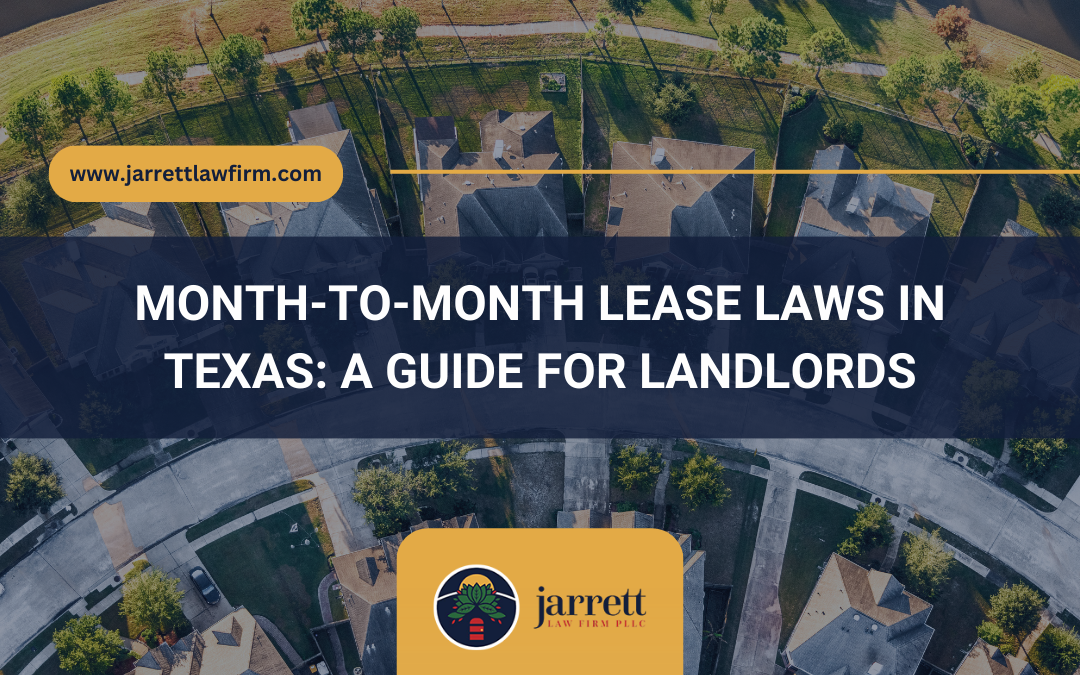As a landlord, considering month-to-month lease laws in Texas can provide you with flexibility while accommodating tenants who prefer short-term arrangements. However, with this flexibility comes the need to understand the legal obligations and protections available to you.
By knowing the ins and outs of Texas lease laws, you can ensure that your property remains protected and you maintain control over how long a tenant stays.
Let’s explore the key aspects of month-to-month leases from your perspective so you’re well-prepared for any potential changes in your rental agreement.
How Do Month-to-Month Leases Work in Texas?
Month-to-month leases in Texas offer flexibility but come with specific legal guidelines that both landlords and tenants need to follow.
Unlike fixed-term leases, these agreements don’t have a defined end date, and they automatically renew at the beginning of each month unless either party decides to terminate.
Let’s go over how they work and what you should know as a landlord.
Understanding a Month-to-Month Tenancy
In Texas, month-to-month leases operate under a periodic tenancy, which means they renew at the start of each rent period. Whether it was originally a fixed-term lease that has expired or a rental that began as a month-to-month agreement, the main advantage is flexibility.
However, with that flexibility comes the need for clear communication about changes or ending the lease.
Notice Requirements
Texas law requires at least a 30-day written notice from either the landlord or tenant to terminate a month-to-month lease. This period allows both parties to make necessary arrangements, such as finding a new tenant or planning for the move. The notice must be given before the next rent payment is due, making timing critical.
If a landlord wants to change any lease terms, such as increasing rent, a 30-day notice is also required to give the tenant time to decide whether to agree to the new terms or terminate the agreement.

Increasing Rent
Landlords are free to raise the rent during a month-to-month lease, provided they give the tenant at least 30 days’ notice before the new rent takes effect. This allows the tenant enough time to either accept the new rent or decide to move out.
There are no legal restrictions in Texas on how much a landlord can increase the rent, but clear communication and documentation are essential to avoid misunderstandings.
What Happens When the Lease Ends?
If you or your tenant decide to end the month-to-month lease, the termination must follow the proper notice period.
The lease automatically terminates 30 days after notice is provided unless both parties agree to a different time frame.
Tenants are only required to pay rent for the duration of their stay, and landlords should expect pro-rated payments if the lease ends mid-month.
Managing Repairs and Responsibilities
As a landlord, you are responsible for maintaining the rental property and making necessary repairs. Tenants can notify you in writing if repairs are needed, and you must address these issues within a reasonable timeframe. Failure to do so could result in the tenant seeking legal remedies. A tenant may also decide to enact other strategies, such as withholding rent or breaking the lease.
Texas month-to-month leases offer both parties a flexible arrangement, but understanding the legal obligations is key to managing your property successfully. Make sure to keep everything in writing, provide timely notices, and stay on top of repairs to avoid disputes.

If you’re dealing with real estate disputes and evictions, you don’t have to navigate the legal process alone. Jarrett Law is here to help you protect your investment and move forward with confidence.
Call us today at (832) 831-0833 to schedule a consultation and find out how we can assist you.
Eviction With a Month-to-Month Lease Agreement
Evictions under a month-to-month lease in Texas can happen for a variety of reasons, but understanding your legal rights and the proper steps is essential for a smooth process.
Let’s walk through the key aspects of evicting a tenant with a month-to-month lease agreement so you can ensure everything is handled legally and fairly.
Reasons for Eviction in a Month-to-Month Lease
In Texas, a landlord can terminate a month-to-month tenancy for almost any reason as long as it does not violate anti-discrimination or retaliation laws.
Common reasons include:
- Non-payment of rent
- Damaging the property
- Violating the lease terms
However, you don’t need to provide a specific reason to end the lease. Unlike a fixed-term lease, where you might have to wait until the lease term expires, you can proceed with eviction once you follow the proper notice requirements.
How Much Notice Is Required?
Texas law requires a landlord to provide at least a 30-day written notice before evicting a tenant from a month-to-month lease. This notice must be given before the next rent payment period starts.
For instance, if the tenant’s rent is due on the first of the month, and you want the tenant to move out by the end of that month, you must give notice no later than 30 days prior.
Make sure to deliver the notice in writing, as verbal notices are not legally enforceable in Texas.

Eviction Process and Court Involvement
If the tenant refuses to move out after receiving the 30-day notice, you’ll need to follow the formal eviction process.
- This begins by filing an eviction suit with the justice court in the county where the rental property is located.
- The court then sets a hearing date within 10 to 21 days of filing the suit.
- Both you and the tenant then present your cases at this hearing.
- If the court rules in your favor, a Writ of Possession is issued, which legally allows you to remove the tenant and their belongings from the property. You can do this by working with the sheriff’s department.
Dealing With Tenant’s Lease Violations
If you’re evicting a tenant for a violation of the lease agreement, such as not paying rent, you need to document the violation carefully.
Texas law requires landlords to provide a “Notice to Vacate” in cases of lease violations. This notice typically gives the tenant three days to either correct the violation (such as paying rent) or move out. If the tenant does not comply, you can proceed with the eviction process in court.
In Texas, for a month-to-month lease, the time period for eviction after a “Notice to Vacate” depends on the reason for the eviction:
- Non-Payment of Rent or Lease Violation: If the eviction is due to a violation such as non-payment of rent, the tenant is typically given 3 days to either correct the issue (like paying the overdue rent) or vacate the property. This is a standard provision under Texas law, and the 3-day notice must be given before filing an eviction suit.
- Termination of Month-to-Month Lease Without Cause: If the eviction is not based on a lease violation and the landlord simply wishes to terminate the lease, the landlord must provide at least 30 days’ notice. This 30-day period allows the tenant time to find a new place and move out.
What Happens to the Security Deposit?
In Texas, once the eviction is finalized, you can withhold part or all of the tenant’s security deposit to cover unpaid rent or damages to the property, as long as it’s in line with the terms of the rental agreement.
You must return the remaining portion of the security deposit within 30 days after the tenant moves out, along with an itemized list of any deductions you made.

Final Thoughts
Evicting a tenant under a month-to-month lease can be a straightforward process if you follow Texas law. By giving proper notice, documenting lease violations, and handling the security deposit fairly, you can avoid potential legal pitfalls.
Always ensure that your communication with tenants is clear, in writing, and in line with the lease terms to protect both your property and your legal rights.
Experienced Real Estate and Evictions Attorneys Can Help
Navigating the legal complexities of real estate and tenant disputes can be overwhelming, especially when handling an eviction process. Whether you’re dealing with a difficult tenant, unpaid rent, or lease violations, having the right legal support is crucial to protecting your property and rights.
At Jarrett Law, we offer in-depth knowledge of Texas real estate laws and are ready to guide you through each step of the eviction process.
Tailored Legal Solutions for Landlords
Every rental situation is different, and we know how important it is to provide legal solutions tailored to your specific needs.
Whether you’re looking to remove a tenant for non-payment of rent or seeking to terminate a month-to-month lease, we help you navigate the legal procedures in a way that minimizes disruptions and ensures compliance with Texas law.
We handle the entire process—from the initial notice to vacate to representing you in court, ensuring that every step is properly followed.
Protecting Your Property and Legal Rights
Evicting a tenant involves more than just serving a notice. Mistakes during the eviction process can lead to delays, legal challenges, and even financial losses.
At Jarrett Law, we work with you to safeguard your property and avoid costly errors so you can focus on running your business.
Our experienced attorneys ensure that your notices are correctly served, court filings are timely, and that all actions are in line with Texas law.
Get Expert Guidance Today
When it comes to real estate disputes and evictions, you don’t have to navigate the legal process alone. Jarrett Law is here to help you protect your investment and move forward with confidence.
Call us today at (832) 831-0833 to schedule a consultation and find out how we can assist you.




Recent Comments